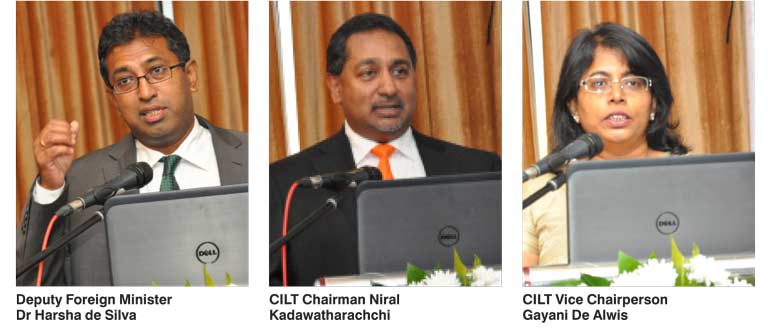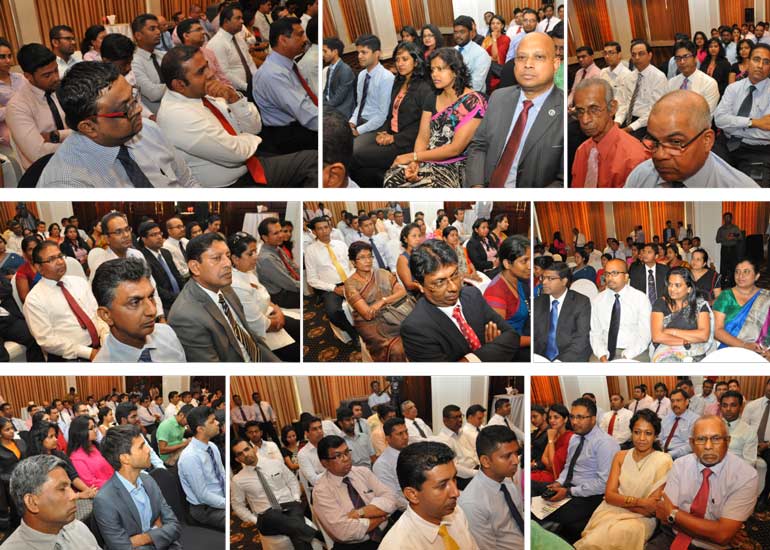Wednesday Feb 25, 2026
Wednesday Feb 25, 2026
Monday, 28 September 2015 00:00 - - {{hitsCtrl.values.hits}}

By Madushka Balasuriya
Services based on logistics and transport, not manufacturing, will be the ‘driving force’ behind Sri Lanka’s economy in the years to come, proclaimed Dr. Harsha De Silva.
The newly-appointed Deputy Minister of Foreign Affairs was Chief Guest at the Chartered Institute of Logistics and Transport’s (CILT) Corporate Partnership re-launch event in Colombo on Tuesday.
Addressing the gathering, he took the opportunity to provide a glimpse into the plans the Government is putting in place to extricate itself from ‘the complex mess’ leftover by the previous regime.
“The future of our nation really lies in how, in the next five years, we do what needs to be done in order leverage our competitive position as a nation, given where we are located. All what we’re trying to do: An economic agreement with India, the TPP with the United States, a dockyard or industrial park at the Hambantota port with the Chinese; all of these things, if we plan carefully and implement properly, would augur well for this industry,” promised Dr. De Silva, referencing the logistics and transport industry, which he sees as the key in the nation’s economic recovery.
He noted that, in 2012, Sri Lanka’s exports as percentage of GDP (Gross Domestic Product) had reached the same levels as they were in 1970.
“Can you believe, after so many years, we’ve gone back to where we were?” he asked incredulously. “If you look at Sri Lanka’s exports with the rest of the world 10 years ago, it was 35% of GDP; today, end of December 2014, it is 14.9% of GDP.
“Sri Lanka’s future depends on exports, and for exports to happen we have to have imports. Because Sri Lanka is never going to be a large manufacturing hub; Sri Lanka will be a logistics hub. Sri Lanka will be a hub where value will be added.”
However, key in boosting Sri Lanka’s international trade is GSP Plus; the EU’s ‘Generalised Scheme of Preferences’ (GSP) allows developing country’s exporters to pay less or no duties on their exports to the EU. This gives them vital access to EU markets and contributes to their economic growth.
Sri Lanka lost GSP Plus status in 2010 after the United Nations Human Rights Council (UNHRC) alleged violations of Human Rights during the civil war. Dr. De Silva was confident that following talks with the visiting German Foreign Minister Frank-Walter Steinmeier, Sri Lanka would regain GSP Plus status ‘as soon as possible’.
“The Germans did actually say they will fully support us. They will do whatever it takes for us to get it back. My assessment is by the middle of next year (2016) we should have it back. But remember the issues are not trade or economic related; it’s really human rights related. So a lot is riding on what happens in Geneva,” he noted, referring to the recently released UN report, which called on those suspected of war crimes during the civil war to be tried in a special hybrid court comprised of international judges.
Fishing ban
The Deputy Foreign Minister also had good news with regard to the current ban placed on Sri Lanka’s fish exports to the European Union. The ban went in to effect in January earlier this year after Sri Lankan fishermen were found to have been using illegal fishing methods.
Dr. De Silva said that they have been working hard to meet the EU’s requirements, such as installing Vessel Monitoring Systems, but nevertheless urged cautious optimism.
“We cannot assume that we’ll be able to sort it out because it is a complex thing. Know that we’re genuine and we’re working on it. So in November we expect the European Union Director General, who’s in charge of this process, to come here. And by then we hope to have completed what we were supposed to complete when we undertook to deal with the past wrongs.”
New appointment
In his wide-ranging speech, Dr. De Silva also addressed his somewhat surprising appointment in the Foreign Ministry, having previously been involved in policy planning.
“In a way, people were a little bit disappointed I guess, that Harsha De Silva was not given a responsibility in either the Ministry of Finance or Economic Affairs,” he said broaching the elephant in the room carefully. “But you need to learn other things also, you can’t be the General Manager just being in HR, you need to learn Finance, you need to learn other things too. So it’s an opportunity, particularly these couple of years, for me to learn what’s going on outside Sri Lanka from a state perspective, and how we deal with the international community.”
Dr. De Silva’s positive spin on the matter could be seen as a demonstration of his suitability to the role, which according to him plays a far more crucial role now than in years gone by. He says better Sri Lankan representation is needed in places where trade takes place and business entities meet.
“Traditional diplomacy was about peace. As long as the two countries were not at war you were being successful. But I think that era is gone. What is in the future is prosperity. Prosperity is about economics, trade, and taking Sri Lankan businesses overseas,” he explained, adding that the Government is in the process of restructuring the foreign office and ‘giving more emphasis to economic diplomacy in the future’. Pix by Shehan Gunasekara
